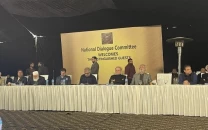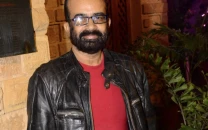Contempt of court act: ‘Who says there will be a crisis if contempt act struck down?’
Chief justice says SC is not bothered about what is speculated upon outside court.

Chief Justice Iftikhar Muhammad Chaudhry on Thursday rubbished murmurs of a constitutional crisis if the new contempt law was struck down by the apex court.
On Wednesday, the court had asked Abdul Shakoor Piracha, counsel for the federation, to produce the record of parliament’s relevant proceedings on the contempt of court act to see the time consumed in debate. On Thursday, the chief justice, while heading a five-judge bench hearing 27 identical petitions challenging the contentious law, heard speeches given by parliamentarians, in favour and against, the contempt of court act, during parliamentary proceedings.
A petitioner in the case, President Lahore High Court Bar Rawalpindi Division Advocate Ahsanuddin Sheikh, discussed speeches given by Senators Haji Adeel and Azam Khan Hoti of the Awami National Party (ANP) in which they had censured the judiciary and the chief justice in particular.
“The judiciary is strengthening parliament while parliament is pulling legs of the judiciary,” contended Sheikh. Sheikh went on to add that there was fear, outside the courtroom, of a constitutional crisis if the new contempt law was struck down by the apex court.
“Who says that nullifying this law will create a crisis,” the chief justice replied to the petitioner, adding that the court was not bothered with anything that was taking place outside the court.
“We don’t decide on what is said outside. What happens outside the court’s doors does not bother us,” the chief justice said.
Meanwhile, Justice Jawwad S Khawaja observed that though the proceedings of parliament could not be challenged due to Article-69 of the Constitution, certain clauses could be sent back by the court to parliament for a review.
During proceedings, Sheikh also said that the contempt of court act was passed in haste by the government, adding that members of parliament deviated from their oath by passing the law as the government was to submit its reply in the NRO implementation case on July 12.
“The law was passed to protect Prime Minister Raja Pervaiz Ashraf,” said Sheikh, who is one of over 20 petitioners in this case, which challenges the new contempt act that, among other things, provides immunity to the prime minister and other high public office holders from contempt proceedings. The new contempt law was bulldozed through both houses of parliament shortly after Prime Minister Raja Pervaiz Ashraf took office and was sent notices by the apex court to implement its orders on the National Reconciliation Ordinance (NRO) case. The same case saw Yousaf Raza Gilani disqualified from premiership and membership of the National Assembly for contempt.
The matter has been was adjourned till Friday (today).
The Supreme Court has already shot down the government’s plea for forming a full bench on the matter, as well as a request for adjourning the hearing for a longer period of time to allow its counsels to prepare their arguments.
Published in The Express Tribune, July 27th, 2012.



















COMMENTS
Comments are moderated and generally will be posted if they are on-topic and not abusive.
For more information, please see our Comments FAQ